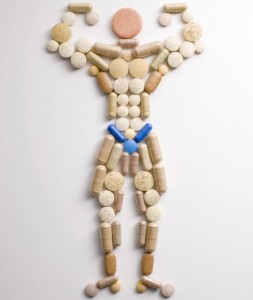Another useful article from our friends at the Daily Mail Health section. All you need to know from an authoritative source.
By Daily Mail Reporter
Last updated at 10:31 AM on 19th April 2011
We all try to get the nutrients needed for good health, but hectic lifestyles, bad habits and modern-day stresses mean there are times our bodies need a little help.
Dietitian and nutritionist Dr Frankie Phillips says multivitamins provide a good top-up, but there are times when we may need to boost levels of specific nutrients: ‘Most people in the UK don’t have enough vitamin D for example, particularly since its main source is sunlight and we’ve all been indoors over winter,’ she says.
Every part of your body has its own demands — and there’s a pill for all of them. So here is the ultimate top-to-toe guide to the best supplements for your key organs and systems. For herbal medicines, always look for a THR number on the pack. This indicates that it’s registered by the Medicines and Healthcare Regulatory Authority.
Pill power: Taking supplements for the part of the body which is underperforming can transform your health
A review of 15 reputable studies reported calcium supplements reduce the rate of bone loss women experience after menopause. Calcium is usually taken with vitamin D as this improves its absorption.
The Department of Health advises it’s safe to take up to 1,500mg a day, while the American National Academy of Sciences recommends a daily dose of 1,200mg of calcium with 0.15mg of vitamin D.
Taking larger doses could cause stomach pain and diarrhoea.
Vitamin D: Thought to improve mental agility for many
BRAIN: Vitamin D and St John’s Wort
Researchers have identified a link between mental agility and vitamin D.
In a study of more than 3,000 people by Manchester University, those with the highest levels of the vitamin performed best on memory tasks.
Researchers think the nutrient protects signalling pathways in the brain.
The Department of Health advises vitamin D supplementation for everyone over 65, children aged six months to five years, pregnant and breastfeeding women, people who are housebound, and those who have dark skin or cover up for religious reasons.
The respected Cochrane Review found St John’s Wort is as effective as prescription medicines for mild to moderate depression.
However, it can interfere with other medicines, including the Pill.
DIGESTION: ARTICHOKE AND PEPPERMINT OIL
A trial at the University of Essen, Germany, found artichoke extract is an effective treatment for indigestion.
A twice-daily dose of 320mg of an extract was used in the trial. Earlier studies have shown it increases production of bile, which the body uses to break down and digest fats.
Peppermint oil is more effective than prescription medications at treating irritable bowel syndrome, a study in The British Medical Journal found. Antispasmodics reduced symptoms by 32 per cent, while peppermint oil produced a 57 per cent improvement. Doses ranged from around 500mg to 600mg daily.
EYES: VITAMINS C & E AND ZINC
Sight can be protected with high doses of antioxidants — vitamins, minerals and other nutrients that mop up damaging molecules known as free radicals — according to a large trial by the National Eye Institute in America in 2001.
The Age-Related Disease Study, also called AREDS, found a specific combination of antioxidants significantly reduce the risk of age-related macular degeneration.
This condition occurs when the retina is damaged by debris or blood vessels growing where they shouldn’t. It is the most common cause of loss of vision.
The AREDS combination is a daily dose of 500mg of vitamin C, 400iu of vitamin E, 15mg of beta-carotene, 80mg of zinc and 2mg of copper. It’s thought they improve blood flow to the eye.
However, beta-carotene taken at these levels can cause skin yellowing and has been linked to an increased risk of lung cancer among smokers
A study of Alaskan eskimos, published in the European Journal of Clinical Nutrition, has confirmed the cardiac benefits of omega-3 oils.
These fatty acids, found in oily fish, lower levels of fats called triglycerides, which increase the risk of heart disease and diabetes.
A daily dose of 1,000mg has been shown to be effective in a number of studies, including one published in The Lancet, which found it halved the risk of a coronary in patients who had already suffered a heart attack.
High doses of omega-3 should not be taken without consulting a doctor.
Berry good: Cranberries are used for urinary tract and kidney infections
KIDNEYS: Vitamin B6 and cranberry
Water is one of the best ways to maintain kidney health, but vitamin B6 also has proven renal benefits.
A 14-year study of more than 85,000 women found that those with a daily intake of 40mg or more had a 60 per cent less risk of kidney stones than those who had less than 3mg a day.
Urinary tract and kidney infections can be prevented with cranberry supplements or juice, according to researchers at Stirling University.
Researchers said those with recurrent problems are most likely to benefit, but there was no clear evidence for the ideal dose.
Several studies used supplements containing 400mg of cranberry solids, others used between 30ml and 300ml of juice a day.
FERTILITY: VITAMIN C AND ZINC FOR MEN, ANTI-AGEING HORMONE FOR WOMEN
Men with low sperm counts or motility are the most likely to benefit, according to a review of trials involving more than 1,000 couples having fertility treatment.
Researchers from the University of Auckland, New Zealand, focused on trials that used a range of antioxidants, including vitamins C and E, as well as L-carnitine, zinc and magnesium.
They believe the antioxidants protect against sperm DNA damage.
DHEA, an anti-ageing hormone, triples a woman’s chance of conception, a trial at Tel Aviv University, Israel, found.
Women undergoing fertility treatment were also six times more likely to give birth to a healthy baby after taking 75mg a day of DHEA.
Dr Norbert Gleicher, a DHEA expert based at the Centre for Human Reproduction in New York, believes it makes egg quality better by improving the ovarian environment.
Lutein and zeaxanthin — chemicals known as carotenoids and found in leafy green vegetables — improve skin texture and appearance.
A trial by the University of Naples, Italy, on 120 women with premature skin ageing, found that a daily dose of 10mg of lutein improved skin hydration by 38 per cent and elasticity by 8 per cent.
Research by the University of Nottingham has also shown that carotenoids produce a golden, suntan-like glow, which people find attractive.
Medicinal milk thistle: The Silymarin it contains aids liver repair
The active ingredient in milk thistle, silymarin, has anti-inflammatory properties and appears to aid liver repair by stimulating the growth of new cells. Laboratory tests have confirmed that it raises levels of glutathione, a protective antioxidant the liver uses to eliminate toxins.
Trials showing efficacy, including a study at the Mount Sinai School of Medicine, New York, which was published in Clinical Gastroenterology, used daily doses of 500mg and above.
However, milk thistle may interact with other medications such as statins and antibiotics. Consult your GP before taking.
JOINTS: COD LIVER OIL AND DEVIL'S CLAW
A Canadian trial found glucosamine is 25 per cent more effective at reducing join pain and stiffness when combined with cod liver oil.
Six out of ten patients with arthritis or rheumatic conditions were able to reduce painkillers after taking 480mg daily of plant root Devil’s Claw for eight weeks in a trial, at Queen Margaret University in Edinburgh.
Read more: http://www.dailymail.co.uk/health/article-1378289/From-toe-theres-pill-EVERY-body.html#ixzz1Jxbgv0ju









